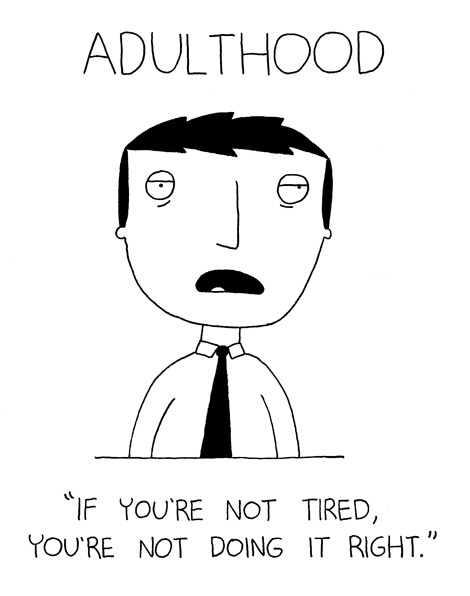My adolescence, which doesn't feel like it's over yet, was characterised chiefly by doubt. First, doubt of everything people were saying around me, and then, overwhelmingly, doubt of myself. Self-doubt has become basic to how I approach life, taking my cue from the scientific method and republican and Marxist humanism.
The flip side of doubt, to my mind, is confidence. In anything. Confidence seems like glorified blind faith, whether it's in a set of beliefs or in your own abilities. It is antithetical to criticism, to commitment to the truth and to authenticity. It is basically superstition, and like most superstitions, basically in service and affirmation of the status quo. Confidence is a guy smiling with two thumbs up and telling you everything is a-okay. But I don't think even he really believes himself.
I feel like I've been carrying with me, almost everywhere, as a sort of alternative to confidence, an all-pervasive ironic detachment. If confidence is religion, irony is the nihilistic overreaction of atheism. It preserves doubt, but to no actual purpose. It's a sort of neutered rebellion, because instead of changing anything it ignores the problem. Together with doubt, it implicitly preserves the basically religious notion of shame in deviance, because the alternative remains unvoiced.
Which got me thinking about a possible truer secular alternative to confidence, which is pride. Pride in doubt. I know pride is a major sin in Christianity, but I think its condemnation is basic to all repressive systems. Pride means not needing outside affirmation. It means you're okay even if you're wrong. It means that you're human and you deserve to be loved. Maybe that's the value of the artistic public exhibition of weaknesses and pain. It's a sad pride parade. It's probably what this blog's about goddammit. Claiming your space without becoming doctrinaire. The same ways gays aren't actually trying to get straight people to sleep with people of their own sex. I would guess all people with an effective religious upbringing have a really hard time getting their heads around that. You express yourself merely to communicate that you rock.
The flip side of doubt, to my mind, is confidence. In anything. Confidence seems like glorified blind faith, whether it's in a set of beliefs or in your own abilities. It is antithetical to criticism, to commitment to the truth and to authenticity. It is basically superstition, and like most superstitions, basically in service and affirmation of the status quo. Confidence is a guy smiling with two thumbs up and telling you everything is a-okay. But I don't think even he really believes himself.
I feel like I've been carrying with me, almost everywhere, as a sort of alternative to confidence, an all-pervasive ironic detachment. If confidence is religion, irony is the nihilistic overreaction of atheism. It preserves doubt, but to no actual purpose. It's a sort of neutered rebellion, because instead of changing anything it ignores the problem. Together with doubt, it implicitly preserves the basically religious notion of shame in deviance, because the alternative remains unvoiced.
Which got me thinking about a possible truer secular alternative to confidence, which is pride. Pride in doubt. I know pride is a major sin in Christianity, but I think its condemnation is basic to all repressive systems. Pride means not needing outside affirmation. It means you're okay even if you're wrong. It means that you're human and you deserve to be loved. Maybe that's the value of the artistic public exhibition of weaknesses and pain. It's a sad pride parade. It's probably what this blog's about goddammit. Claiming your space without becoming doctrinaire. The same ways gays aren't actually trying to get straight people to sleep with people of their own sex. I would guess all people with an effective religious upbringing have a really hard time getting their heads around that. You express yourself merely to communicate that you rock.





